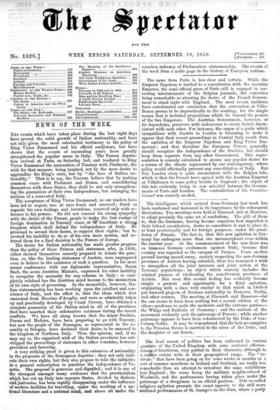The intelligence which arrived from Germany last week has been
confirmed and increased in its importance by the subsequent _discussions. Two meetings were held at Eisenach and at Hanover, to adept precisely the same set of resolutions. The pith of them is, that the Germans, having become 00IISOi011s how imperfect is their federal constitution, desire to consolidate it and to place it, at least provisionally and for foreign purposes, under the presi- dency of Prussia. The fact is, that this new agitation in Ger- many lip undergone more than one metamorphosis even within the current year. At the commencement of the war there was an immense German excitement against Italy, because that country was regarded as the catspaw of France. Fears on that ground having passed away, anxiety respecting the non-German provinces of Austria having subsided, there has remained a wish to strengthen all the joint interests and joint action of the Teutonic populations ; an object which scarcely includes the original purpose of vindicating the non-German provinces of Austria. But even this second feeling has evidently become simply a pretext and opportunity for a third agitation, originating with a class very similar to that which in 1848-9 put forward. projects of German nationality in Hanover, Berlin, and other centres. The meeting at Eisenach and Hanover—for the one seems to have been nothing but a second edition of the other—professes to unite the moderate and the extreme parties— the Whigs and Radicals of Germany ; and the authors of the movement evidently seek the patronage of Prussia ; while another patronage appears to have been volunteered by the Duke of Sax- Coburg Gotha. It may be remembered that the heir presumptive to the Prussian throne is married. to the niece of the Duke, and the daughter of our Queen.


























